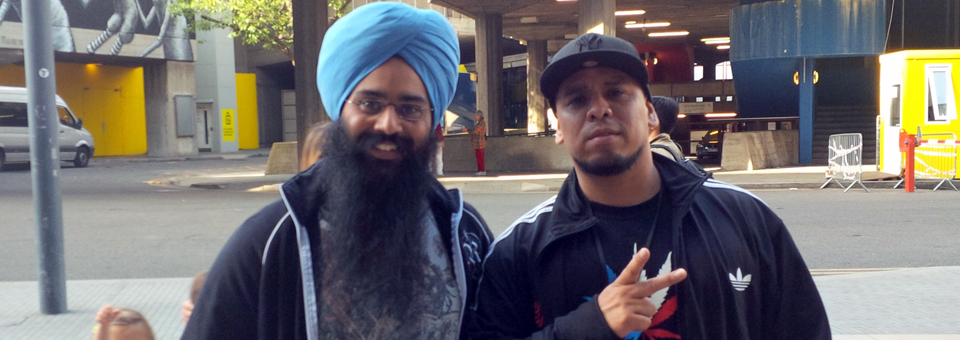Music is and has long been the most popular way for people to reflect shared human emotions, ideas and opinions. The most remembered artists of the last century are those who expressed what millions of others felt but could not vocalise. Through a combination of lyrics, rhythm and melody, a musician encapsulates the joy, pain and struggles of our lives, but at the same time inspires us to strive forward as we deliberate over their creations. In recent years, musical acts have been increasingly criticised for pandering to a corporate lobby of what should be released and how it should be performed, all determined by what will garner the highest financial rewards. But there are some acts who have remained pure to the art of creating music and giving voice to the voiceless masses. Key amongst these is the New York rapper Immortal Technique, quite probably the best example of a musician harnessing 21st century global communications, but staying true to his place as an artist. After almost a decade of solely experiencing his work from the other side of a computer screen and internet connection, I grasped the opportunity of seeing him live in London yesterday and was so enamoured by what I witnessed that I felt compelled to write about it.
I grew up listening to a lot of different types of music, but by a clear mile my favourite genre has always been hip hop. I fitted the stereotype son of immigrants who found that A Tribe Called Quest, Cypress Hill and Nas were voicing a life that in some way matched my own, even if I was quite removed from their harsh backdrop of the US. Growing up as a Sikh who liked hip-hop wasn’t easy though. Surprisingly, my parents and other elders were relatively embracing of hip hop culture – perhaps unsurprisingly considering the rebellious nature of Punjabi people in the 80s and early 90s. What stood in my way were fellow immigrants, (Punjabis, Sikhs and Asians) often a decade to a few years older than me, or even about the same age who saw hip hop as a culture of the ghetto and far removed from the elitist circles in which they saw ‘us’ brown people moving into in the west.
Many Asian people that I came across during my formative years would not accept that they were racist and they probably still don’t. But it was clear in the language that they used to depict hip hop that they saw it as a musical style reflective of its creators (black people) deeming it rudimentary and uncivilised. I never saw hip hop like that. It was a music of the people, created by the people, with notions of social justice and community engagement at its heart. To me hip hop was the music of an eternal revolution under which the need for protest and change will continue until no one person is left behind, until none are devoid of opportunity and until there are no forgotten in our midst. Those who could not see how this is the philosophy behind hip hop in acts as diverse as NWA and The Fugees would have been surprised to learn that Immortal Technique was performing this weekend at the Royal Festival Hall on London’s Southbank – a venue more akin to classical musical repertoire. It is a sign of the strides made by artists like Immortal Technique that he is invited to perform at such diverse venues and a recognition that he is a true poet and most talented lyricist.
In the last year, I have twice missed the opportunity to see him perform live. Friends who have gone on both occasions spared no details in telling me how rapturous he was and how I had missed an inspiring night. So when I came to learn of Immortal Technique’s appearance at this Yoko Ono curated Meltdown Festival, I knew I had to get tickets. A close friend of mine with whom I have seen the likes of Public Enemy and the Wu Tang Clan was just as excited to go and we looked forward to the experience despite reservations about how the venue might affect the atmosphere. We needn’t had worried. Immortal Technique was ably supported by two acts – Hasan Salaam and AKIR, both with New York connections and hip hop artists of a similar mould. Unlike many hip hop shows, this was a performance that ran to time, and having ably warmed up the growing crowd, the pair announced Immortal Technique to a standing ovation and thus began the experience of seeing and hearing a lyrical genius of our times. It sometimes felt as if I had wandered into a political rally or a religious festival, so intense was the attention which the Messiah on stage commanded. But unlike those hollow gatherings that are inflicted upon us in our name by leaders not of our choosing, Immortal Technique brought the crowd to a sharp focus, repeatedly instilling belief and imparting the knowledge that ‘we’ collectively are the revolution and the prophets of our destiny. He is for me a great example of a person who genuinely sees all people as one. His fight for justice spans from the local to the international arena, as did that of his cohorts on stage. The mainstream media has likened him to a modern-day Mother Teresa who cares for people that are not ‘his own’ as well as fighting the injustices at his own door, but this would be incorrect because he genuinely sees all people as one and makes no distinctions as to who are ‘his own’ and who are ‘others’.
A few hours before the show, outside the venue we casually bumped into Felipe Andres Coronel – better known by his musical name and apt moniker Immortal Technique. He was the epitome of a gentleman, noticing me notice him and pausing to shake my hand as I gushed my admiration for his work without embarrassment. Moreover, as I asked to take a photo he politely asked a member of the venue staff to take it for me so that I could pose alongside him in comfort. It wouldn’t do this man justice to say that he is humble. I’ve been fortunate enough to meet a handful of well known musical artists whom I have found to be the same. There is something different about Immortal Technique, something more to him; he is more real. He looked me in the eye as he shook my hand and listened intently to my brief praise as if I was regaling him with some vital news that had befallen some part of the World. Perhaps it is these attributes that mark him out in the congested hip hop World, that have made him a well-informed individual and a true social commentator in the mould of musical greats like Chuck D or KRS-One. He is to me a great role model and for a Sikh that is no mean feat, tied as we are to the Khalsa – those who go above and beyond the call of duty every second of their lives. I was not alone at the show in this respect, as a visible number of other Sikhs were in attendance and we even received his gratitude from the stage in closing: “… Sikhs, I love you, always supporting”. He remained in the lobby for hours after the event signing tickets, t-shirts and just saying thanks to those who had come out. Rare, intelligent and real, Immortal Technique.





